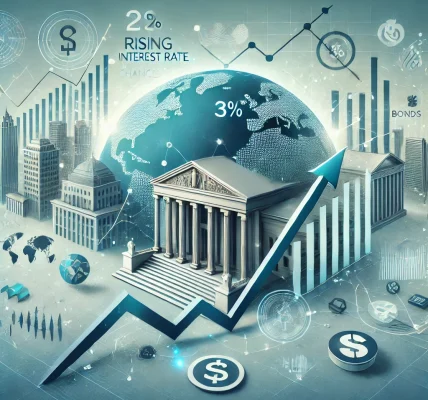Introduction
The stock market has always been influenced by multiple factors, including economic trends, political events, and investor sentiment. However, with the rise of Artificial Intelligence (AI), stock market predictions are undergoing a massive transformation. AI-driven models, powered by machine learning, deep learning, and big data analytics, are enhancing the accuracy and efficiency of stock market forecasts.
In this blog, we will explore how AI is revolutionizing stock market predictions, the key technologies involved, its benefits, challenges, and the future outlook.
1. The Role of AI in Stock Market Predictions
AI is changing the way investors analyze and interpret stock market data. Traditional methods relied heavily on human expertise, fundamental analysis, and technical indicators. AI, on the other hand, can process vast amounts of data in real-time, identify hidden patterns, and generate accurate forecasts.
Key Functions of AI in Stock Market Predictions
- Sentiment Analysis: AI can analyze news articles, social media trends, and earnings reports to gauge market sentiment.
- Algorithmic Trading: AI-powered trading bots execute trades at high speeds based on predefined strategies.
- Risk Assessment: AI evaluates financial risks based on historical and real-time data.
- Market Pattern Recognition: Machine learning models identify repetitive stock price patterns for better predictions.
- Portfolio Optimization: AI helps investors create well-diversified portfolios by analyzing risk-return ratios.
2. Key AI Technologies Driving Stock Market Predictions
AI leverages several advanced technologies to enhance stock market forecasting. Below are the most prominent ones:
1. Machine Learning (ML)
Machine learning algorithms, such as supervised and unsupervised learning, analyze large datasets to predict future stock trends. Popular ML models include:
- Linear Regression: Predicts stock prices based on historical data.
- Random Forest: Uses multiple decision trees to improve prediction accuracy.
- Support Vector Machines (SVMs): Identifies trends by categorizing stock price movements.
2. Deep Learning
Deep learning, a subset of ML, uses neural networks to process complex stock market data. Some popular models include:
- Recurrent Neural Networks (RNNs): Analyze time-series data to forecast stock movements.
- Long Short-Term Memory (LSTM) Networks: Handle sequential data with high accuracy.
- Convolutional Neural Networks (CNNs): Extract features from financial charts and images.
3. Natural Language Processing (NLP)
NLP enables AI to understand and interpret textual data such as:
- News articles
- Earnings reports
- Social media sentiment
- Federal Reserve statements
4. Big Data Analytics
AI processes vast amounts of structured and unstructured financial data from various sources, including stock exchanges, global markets, and economic indicators, to make informed predictions.
3. Benefits of AI in Stock Market Predictions
1. Improved Accuracy
AI eliminates human biases and enhances prediction accuracy by analyzing historical and real-time market data.
2. Speed and Efficiency
AI-driven trading bots can execute transactions in milliseconds, outperforming human traders.
3. Risk Management
AI continuously monitors market conditions and alerts investors about potential risks.
4. Cost Reduction
Automated AI models reduce the cost of financial research and analysis by minimizing human involvement.
5. Enhanced Decision-Making
AI provides data-driven insights, helping investors make well-informed trading decisions.
4. Challenges and Limitations of AI in Stock Market Predictions
1. Market Volatility
AI models struggle to predict sudden market crashes caused by unexpected events like political instability, pandemics, or natural disasters.
2. Data Quality Issues
AI relies heavily on high-quality and accurate data. Incorrect or outdated data can lead to poor predictions.
3. Overfitting Problem
Some AI models become too specialized in past data and fail to adapt to new market conditions.
4. Regulatory and Ethical Concerns
The use of AI in stock trading raises concerns about fairness, insider trading, and market manipulation.
5. Human Oversight is Still Required
AI is a powerful tool but requires human oversight to interpret complex financial scenarios and prevent erroneous trading decisions.
5. The Future of AI in Stock Market Predictions
The future of AI in stock market forecasting looks promising, with continued advancements in technology and increased adoption by financial institutions. Some upcoming trends include:
1. AI-Driven Robo-Advisors
Robo-advisors will continue to gain popularity, offering personalized investment strategies based on AI analysis.
2. Quantum Computing in Finance
Quantum computing will revolutionize stock predictions by solving complex financial models at unprecedented speeds.
3. AI and Blockchain Integration
Combining AI with blockchain technology will enhance transparency and security in stock trading.
4. Explainable AI (XAI)
Regulators and investors will demand more transparency in AI decision-making processes, leading to the rise of Explainable AI.
5. AI-Powered Hedge Funds
More hedge funds will rely on AI for data analysis, portfolio management, and high-frequency trading.
Conclusion
AI is revolutionizing stock market predictions by improving accuracy, efficiency, and risk management. With the help of machine learning, deep learning, NLP, and big data analytics, AI-driven models are transforming how investors and traders navigate financial markets.
However, challenges such as market volatility, data quality issues, and regulatory concerns must be addressed to fully realize AI’s potential. As technology continues to evolve, AI will play an even more significant role in enhancing investment strategies and driving financial growth.
Final Tip: Investors should use AI as a complementary tool rather than relying on it entirely. Combining AI insights with human expertise can lead to smarter investment decisions and greater financial success.
Stay ahead of the curve by embracing AI-driven market analysis and continuously updating your knowledge on emerging financial technologies!




